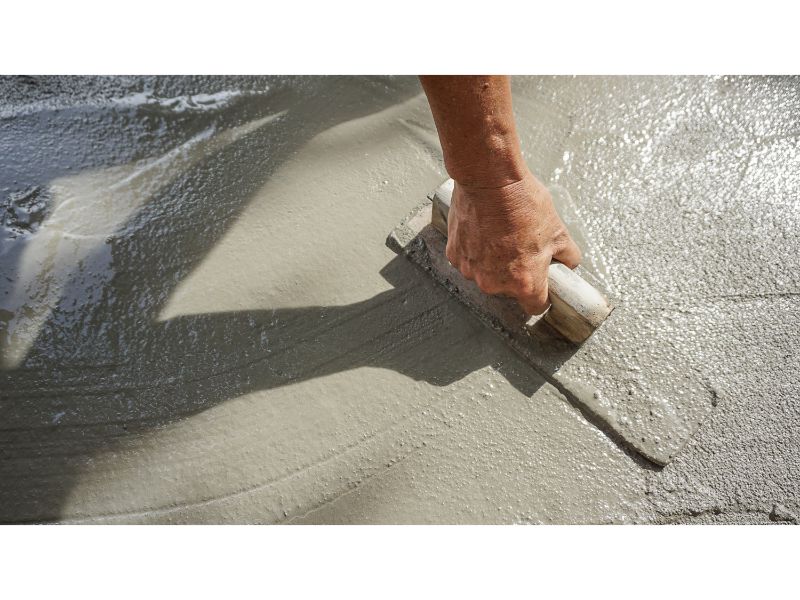Concrete flatwork is a staple of modern construction, used in everything from sidewalks to driveways and parking lots and more. Durable and cost-effective, it can also last for decades with proper care and maintenance, as long as you know how to repair it. In this guide, follow along as we explain how to properly repair and maintain concrete flatwork, and address key related questions, such as why concrete cracks and what to do about it.
Why Does Concrete Crack?
Many people assume that concrete cracks because of one simple reason: over time, water evaporates out of it, causing it to inevitably fracture to release the pressure. But the truth is more complicated than that. Concrete can crack for several reasons, including:
1. Shrinkage: Concrete undergoes a drying and curing process during which it shrinks. This natural shrinkage can result in small, fine cracks, often referred to as “shrinkage cracks.”
2. Temperature Changes: Extreme temperature fluctuations can cause concrete to expand and contract. Over time, this can lead to surface cracks.
3. Settlement and Heaving: Uneven settling of the ground beneath concrete or heaving due to frost can exert pressure on the concrete, leading to cracks.
4. Heavy Loads: Excessive weight or repeated heavy loads, like vehicular traffic on a driveway, can cause concrete to crack.
5. Chemical Reactions: Exposure to certain chemicals or contaminants can weaken the concrete and cause cracks.
6. Improper Installation: Finally, if your concrete wasn’t mixed or poured correctly when it was laid, this too can cause it to develop structural weaknesses that result in cracks.
Will Concrete Always Crack?
While concrete is prone to cracking under certain conditions, it doesn’t mean that it will inevitably crack. Proper construction and maintenance practices can significantly reduce the likelihood of cracks, as well as other types of pavement failure. For example, using proper reinforcement, ensuring a well-graded sub-base, and applying control joints to direct cracks in a controlled manner can minimize the occurrence of unsightly or structural cracks. Routine maintenance, including sealing and addressing small cracks promptly, can also help prolong the life of concrete and prevent major issues.
The Importance of Concrete Flatwork Maintenance
Concrete flatwork, when well-maintained, can withstand the test of time, but it’s not impervious to wear and tear. That’s why maintaining it is important. Regular maintenance (for small fixes) and timely repairs (for large ones) can extend the lifespan of your concrete, saving you money on potentially costly replacements in the future. It’s also safer since neglecting to maintain it can have safety implications, as cracks, potholes, and uneven surfaces can pose a hazard to pedestrians. Finally, well-maintained concrete flatwork can enhance the aesthetic appeal of your property and showcase your commitment to quality and upkeep.
What is Concrete Flatwork Repair?
As mentioned above, concrete will occasionally crack–leaving behind unsightly worn-out areas, as well as making potholes more likely. Fortunately, cracks can be successfully repaired either by using epoxy concrete repair products–short-term solutions that can fill in or patch the cracks–or by hiring a professional paver to perform concrete repair services.
Concrete repair can encompass various tasks, including:
1. Patching: Repairing small cracks, potholes, and surface imperfections by filling them with suitable patching materials to restore the smoothness and integrity of the concrete.
2. Resurfacing: Applying a new layer of concrete over an existing surface that is damaged or worn to restore its appearance and function. This is typically done for more extensive surface issues.
3. Leveling: Addressing uneven surfaces caused by settling or heaving through methods like grinding or mud jacking to make the concrete safe and functional.
4. Expansion Joint Repair: Replacing damaged or deteriorated expansion joints, which are essential for accommodating concrete’s natural expansion and contraction.
The Benefits of Professional Concrete Flatwork Repair
While you can certainly attempt to repair your concrete surfaces yourself, it’s generally recommended that you hire an experienced and trained professional to do it for this. In addition to providing peace of mind that it will all turn out okay, a professional paver can provide the following key benefits:
1. Reliability: Professional concrete flatwork repair ensures a reliable, long-term solution with minimal long-term maintenance required.
2. Aesthetics: Resurfacing concrete repairs will help restore the look and feel of your existing space.
3. Durability: Professional concrete repairs reduce the chance of additional cracking or damage in the future.
4. Efficiency: Professional flatwork repair services can also help those with limited knowledge or experience make any necessary repairs quickly and efficiently.
5. Protection: Professionals can even help with seal coating to help retain the condition of the concrete and further protect the space from future wear and tear.
Conclusion
Concrete flatwork repair and maintenance are crucial aspects to consider when it comes to keeping your concrete surfaces intact. Timely and effective repair can extend the lifespan of your concrete flatwork and enhance the overall appearance of your property, while maintenance can help keep the concrete from crumbling due to exposure to weather elements or shifting of the ground.
For extensive repair needs or projects requiring professional expertise in Austin, consider contacting the experienced paving contractors at Lone Star Paving, today. From parking lot maintenance to complete driving resurfacing, we have the skills and expertise to ensure your concrete surfaces stay in optimal condition for years to come.
Contact our paving team today to keep your property’s concrete flatwork in tip-top shape, and make your property safer and more visually appealing in the process.
